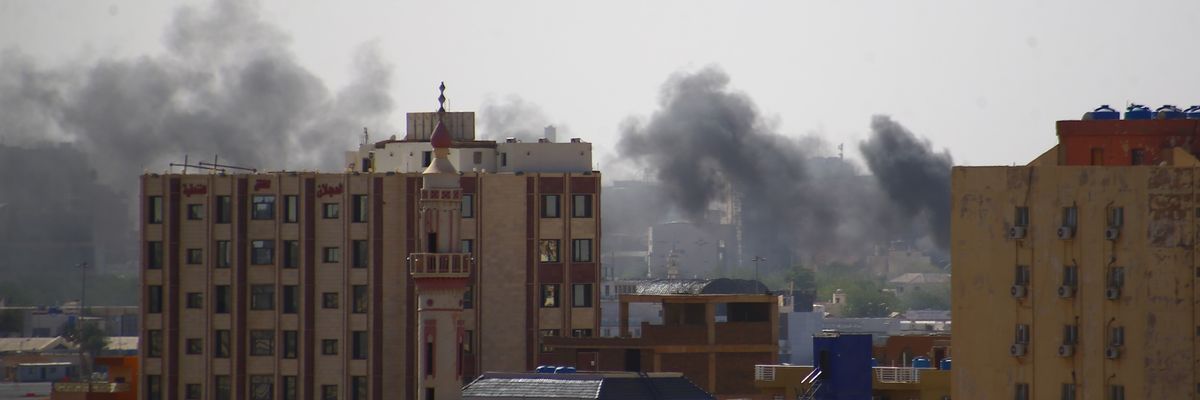Amid a 72-hour truce in Sudan, a United Nations official revealed Tuesday that that one of the warring parties had seized control of a national laboratory in the capital Khartoum that holds samples of multiple diseases, posing a public health threat.
Dr. Nima Saeed Abid, the World Health Organization (WHO) representative in Sudan, spoke to reporters via video conference from the African country, where fighting broke out between the Sudanese Armed Forces (SAF) and the Rapid Support Forces (RSF), a paramilitary group, in mid-April.
Abid explained that ahead of the cease-fire, which took effect at midnight, he received a phone call Monday alerting him that the lab "is occupied by one of the fighting parties and they kicked out all the technicians from the lab, so now it is completely under the control of one of the fighting parties as a military base."
"They kicked out all the technicians from the lab, so now it is completely under the control of one of the fighting parties as a military base."
"And that is extremely, extremely dangerous because we have polio isolates in the lab, we have measles isolates in the lab, we have cholera isolates in the lab," he added. "So there is a huge biological risk associated with the occupation of the central public health lab in Khartoum by one of the fighting parties."
While Abid did not identify which side the fighters are on, an unnamed high-ranking medical source toldCNN that the lab was taken over by RSF forces.
The WHO said that "trained laboratory technicians no longer have access to the laboratory, and with power cuts, it is not possible to properly manage the biological materials that are stored in the laboratory for medical purposes."
Citing the lab's director-general, CNN pointed out that "the power cuts also mean there is a risk of spoilage of depleting stocks of blood bags."
The lab is near the center of Khartoum and the capital's airport. As the BBC detailed:
It lies just outside the area where Sudan's military headquarters are located, and where a lot of the fighting has been taking place.
The particular geography of Khartoum means key strategic sites which are being targeted, such as military buildings, are close to critical infrastructure.
Both the military headquarters and the airport are right next to a residential area, with several schools and hospitals nearby.
Only a fraction of health facilities in Khartoum are providing services due to a lack of staff, medicine, and other supply shortages, power outages, or attacks.
Along with sounding the alarm about the lab, Abid on Tuesday highlighted other health risks related to the ongoing violence, warning of potential outbreaks of cholera, dengue fever, malaria, and measles. The WHO official also said that since the conflict began, at least 459 people have been killed and more than 4,000 injured, though the actual figures are likely far higher.
Even before the fighting erupted earlier this month, an estimated 15.8 million people—or roughly a third of the Sudanese population—were projected to need humanitarian assistance this year, according to the WHO.
"In areas where intense fighting has hampered our humanitarian operations, we have been forced to reduce our footprint," Jens Laerke, a spokesperson for the U.N. Office for the Coordination of Humanitarian Affairs, said Tuesday. "But we are committed to continue to deliver for the people of Sudan."
As Sudanese citizens and others in the country flee Khartoum and other communities impacted by the fighting, United Nations Secretary-General António Guterres has approved the temporary relocation of hundreds of U.N. personnel and their families.
"Let me be clear: the United Nations is not leaving Sudan. Our commitment is to the Sudanese people, in support of their wishes for a peaceful and secure future. We stand with them at this terrible time," Guterres told the U.N. Security Council Monday.
"The violence must stop. It risks a catastrophic conflagration within Sudan that could engulf the whole region and beyond," Guterres said. He called on the warring parties "to stop combat operations in densely populated areas and to allow unhindered humanitarian aid operations," as well as "to de-escalate tensions and to return to the negotiating table."
The U.N. chief also urged Security Council members "to exert maximum leverage with the parties to end the violence, restore order, and return to the path of the democratic transition," declaring that "we must all do everything within our power to pull Sudan back from the edge of the abyss."
The SAF and RSF—led by formerly allied generals, Abdel Fattah al-Burhan and Mohamed Hamdan Dagalo, or "Hemedti," respectively—have already accused each other of violating the current three-day truce, which was negotiated with help from the United States, a permanent member of the Security Council, and Saudi Arabia.
"On Tuesday morning, airstrikes struck the city of Omdurman, a city across the Nile from Khartoum, with a least one bomb hitting a civilian home," according toThe Guardian. "Later in the day, a private clinic in the city was hit by an anti-aircraft rocket, injuring 10 people, and clashes were heard spreading to parts of north Khartoum."
As Atiya Abdalla Atiya of the Sudan Doctors' Syndicate toldThe Associated Press, "They don't respect cease-fires."
